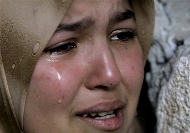
A few days ago, as I arrived home, I was greeted with the blaring noise of a wedding party in the neighborhood; loud and obnoxious. If this were Britain or the U.S. the police would have shut down the party because it disturbed the peace. Of course, this is neither Britain nor the U.S.; it is Palestine.
Whether in the West Bank, the Gaza Strip, or east Jerusalem, the lawlessness experienced is not just about the increasing signs of militarization, it is about being unable to find recourse to law when your civic rights are violated. So, instead of a relaxing evening at home, I had to listen to the music, selected in bad taste I might add, all the while the volume of my TV set competing with the music outside.
Simply put, we are a nation so mired in the political struggle with Israel, that everything else is secondary; perhaps it is unrealistic for me to expect that a politically repressed people would act differently, given the circumstances. I find myself giving people excuses; the economic situation is dire and therefore they might not have been able to hire a proper DJ or band, or rent a wedding hall, and so on and so forth.
This, however, has dangerous implications; if analyzed, it will reveal that this is just a very simple example of how chaos is taking over the Palestinian street. People can be murdered, abused, conned and scammed and absolutely no one and nothing will safeguard their civil rights.
Someone in the office was telling us last week how she was witness to a near rape. When she called the police to intervene, they laughed it off. Two of our staff had items and money stolen from their desks a couple of months back. I was a witness because I saw someone suspicious in the office just before the items went missing and tied him to the theft. So, I went to the police station in downtown Ramallah with my two colleagues, not because I was confident that the officers would be able to uphold the law, but rather in order to reinforce the vitality of their role in society.
Before the Palestinian Authority was established, people felt safer, we had crime, but it was not prevalent and society had a way of dealing with perpetrators, even in the absence of an institutionalized structure. Nowadays, even though there are “law enforcement entities,” they are completely defunct. The security services are in disarray and have conflicting loyalties; if not that, they are inflated with too many members and too little training, and absolutely no idea of their mandate and how to carry it out if they are called upon to do so.
The problems do not end here. Supposedly you were scammed out of money; to what court do you turn to in order to claim what is rightfully yours, especially when thugs are usually dispatched to intimidate the victim? People cede all rights sometimes, because when all the consequences are weighed, that is the only choice. Unfortunately, people have such a lack of faith in the judicial system that it is futile to think that you will find justice, so people resort to traditional means of resolving conflict. This is not to say that the judicial system is dysfunctional, some people find restitution within courts of law; but many have become so cynical that they do not always trust that the judiciary will play the role of impartial arbiters.
Everything is compounded by the Israeli occupation and it is no exception in this case either. The occupation is always raised as a reason as to why we have yet to move ahead in establishing a well-functioning society. True, the occupation hangs over our heads like a brooding cloud, but is that any excuse for us not to demand that the law be respected and applied when and where necessary? The “occupation argument” is valid, but it does not absolve us from doing something constructive in the meantime.
People do care about the resolution of the political conflict and it has so far been Palestinian society’s main focus, but we cannot wait in limbo until there is peace to put our house in order and build the foundations of a modern state. Over the past few years, civil society has been working on various topics and issues to raise awareness of how important it is to be an active citizen and what responsibilities that entails. Sadly, this has neither been internalized across the political spectrum, nor among the populace, who having already been let down time and again by their reality, tend to want instantaneous results and are thus hard to persuade that any initiative undertaken today will have its rewards in the long term.
In spite of that, at a point when people are feeling the crunch with an ostracized political party in place, perhaps it is an opportune time for civil society to once again regain their influence, which has diminished over the past decade, in order to rally the public around issues that concern their daily life and not just the overarching goal of ending the occupation.
Eventually we all hope that this far off goal of being free of an oppressive occupation will be realized, but until then, we must wake up from the reverie that with the dissolution of the occupation everything will be perfect and well. It will not be so unless we prepare the ground today and take charge of our own destiny, so that when the day comes we will already have come most of the way towards being a confident political and social entity.








